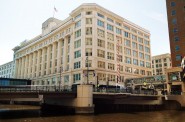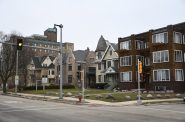BMO Tower Lands Major Accounting Firm
Lease with Baker Tilly pushes tower to 85% full. Plus: Airport hotel sold and a recap of week's real estate news.
Irgens continues to find success in leasing its 25-story BMO Tower office building. The building, completed in 2020, is now reported to be 85% full following a string of new leases. The latest tenant announcement represents one of the largest downtown leases since the onset of the COVID-19 pandemic.
Accounting, tax and financial advising firm Baker Tilly is leasing 40,000 square feet in the 380,000-square-foot building and will relocate its Milwaukee office from the U.S. Bank Center. Since 2012, the company has occupied 68,000 square feet of space spread over three floors in the bank tower, the tallest building in the state.
The size of its new lease, first reported by Tom Daykin, indicates the firm will occupy a floor and a half in BMO Tower, 790 N. Water St. Irgens, with both BMO Tower and its 833 East tower before that, has found success in attracting tenants to more efficient floor plans that have less overall space. BMO Tower’s floor plates cover 25,849 square feet, wrapped by floor-to-ceiling windows. A pandemic-induced shift to hybrid or remote work arrangements is expected to accelerate a downsizing trend across the industry.
Baker Tilly, headquartered in Chicago, has 384 employees in its Milwaukee office. It has offices across the globe, as well as additional Wisconsin offices in Appleton, Eau Claire, Janesville and Madison. It traces its roots back to Watertown, WI and founder Ed Virchow. As of 2020, the firm reported more than 3,700 employees. It is part of the larger network of independent firms across the globe operating as Baker Tilly International.
Other organizations to recently reveal moves to BMO Tower include Fiduciary Management, Inc., Kelben Foundation, Inc., CBRE and Silvercrest Asset Management Group. They’ll join anchor tenants BMO (formerly BMO Harris Bank) and Michael Best & Friedrich. Other tenants include Kahler Slater, B.C. Ziegler & Company, Heartland Advisors and Andrus Intellectual Property Law. Fiddleheads Coffee Roasters operates a cafe along N. Water St. on the first floor, next to BMO’s flagship bank branch at N. Water St. and E. Wells St. A fertility clinic, Kindbody, is expected to open this year in a 7,500-square-foot retail space along N. Broadway.
Assessed for $80.5 million, the building is one of the 10 most valuable properties in the city. The 328-foot-tall tower has a number of amenities, including a shared multi-media conference center, common tenant lounge and terrace on the 12th floor. A tenant fitness center is located underground with private showers and locker rooms. An eight-level parking structure with 653 stalls is included in the building’s base.
Baker Tilly moved its Milwaukee office to the U.S. Bank Center following several years at the Honey Creek Corporate Center on the city’s West Side. When Baker Tilly made its move to Downtown it was represented by broker Steve Palec, then with Cresa. Palec is now the chief marketing officer for Irgens. Before picking the U.S. Bank Center, Baker Tilly considered a move to the proposed Washington Square Tower by Irgens and Van Buren Management. The proposed office tower didn’t move forward.
Airport Hotel Sold
The Sleep Inn & Suites Airport hotel, 4600 S. 6th St., has a new owner according to state real estate records posted on March 2. Elegant Hotels LLC acquired the property for $4 million from an affiliate of Iowa-based Kinseth Hospitality Companies. Elegant Hotel, incorporated in January, lists Chirag I. Patel as its registered agent. The address given for the limited liability company is Country Inn & Suites by Raddison in Mount Pleasant. Kinseth owns several other Wisconsin hotels.
According to city property records, the three-story hotel contains 82 guest rooms. The suburban-style, two-star hotel is located approximately 1.5 miles from the airport and operates a 24-hour shuttle. It opened in 2009.
Weekly Recap
UWM’s New Chemistry Building Topped Off
Construction on UW-Milwaukee’s new chemistry building has reached its highest point.
On Jan. 26, Chancellor Mark Mone gathered with several project partners to sign the highest steel beam in the four-story building and watch it be hoisted into place. It was exactly one year after a ceremonial groundbreaking was held for the facility.
The 163,000-square-foot structure, located at approximately 2000 E. Kenwood Blvd., will be a home for the UWM’s chemistry department and serve as a gateway to all of the university’s science, technology, engineering and mathematics (STEM) departments and buildings.
Design work on the project is being led by CannonDesign and Kahler Slater. VJS Construction Services is leading the general contracting.
Midtown Center Final Bid Tops $24 Million
The Midtown Center shopping complex drew a final bid of $24.3 million in its online auction that closed Thursday.
The winning bidder was not disclosed, but the entity offered a substantial premium from the $7 million opening bid.
Bordered by W. Capitol Dr., W. Fond du Lac Ave. and N. 60th St., the shopping center was listed for sale by New York-based DLC Management with brokerage firm Jones Lang LaSalle (JLL) and online auction service Ten-X.
DLC paid $47.2 million for the center in 2014, but has since sold off the shuttered Lowe’s and Walmart stores. A Pick ‘n Save grocery store and Planet Fitness gym are the anchor tenants in the complex.
New Milwaukee Office Building Would Be Public-Private Partnership
Despite the fact that there has recently been substantial demolition work on the site, the effort to develop a State of Wisconsin office building at N. 27th St. and W. Wisconsin Ave. could take another five years. It also now includes a new legal structure.
Faced with repeated rejections, Governor Tony Evers didn’t include funding for the new building in his 2023-2025 capital budget proposal released Tuesday. The Wisconsin Department of Administration will instead pursue a public-private partnership that would see the state lease space in a new building. The state hopes to begin soliciting private developers later this year.
The change, announced Wednesday, comes as the Republican-controlled state Legislature has twice stripped bonding authority to build the new complex. Last publicly estimated in 2021 to cost $163.6 million, it was to include a 283,00-square-foot office building and a 1,000-space parking structure.
The project was initially started by Governor Scott Walker in 2018; the state has worked with local officials to pursue a replacement for the nine-story Milwaukee State Office Building at 819 N. 6th St. The 163,400-square-foot building was constructed in 1963 and has substantial deferred maintenance. The proposal called for other state agencies that lease office space in Milwaukee to consolidate their operations into the new, state-owned building. The state would sell the downtown building as part of the plan.
MSOE Buys Homeland Security Building
The Milwaukee School of Engineering (MSOE) continues to expand the footprint of its downtown campus. On Wednesday, the university purchased a three-story, 59,429-square-foot office building at 310 E. Knapp St.
“This strategic acquisition will support our academic mission, further strengthening our ability to deliver a top-tier education and the development of the MSOE Mindset in our graduates,” said school president John Y. Walz in a statement. “As demand for our graduates grows, so too should our curricular and co-curricular offerings and campus infrastructure to meet their needs.”
Completed in 2001, the building is currently leased to the U.S. Department of Homeland Security and its U.S. Citizenship and Immigration Services.
The university said it is “considering several potential academic uses” for the building, which now forms the northeast corner of its campus. Viets Field, a parking structure and athletic field, is to the west, the Kern Center wellness facility is kitty-corner to the southwest and the Rader School of Business is located a half block to the south.
Gov. Evers Proposes $5 Million To Advance Bronzeville Center for the Arts
The Bronzeville Center for the Arts, which leaders hope will be a transformative community and arts center for Milwaukee, could get a boost in state funds under Gov. Tony Evers‘ proposed capital budget.
Evers allocated $5 million for the project in his $3.8 billion capital budget, which he announced Tuesday. Those funds would help construct a planned 50,000-square-foot building, which will replace a former Wisconsin Department of Natural Resources office on Milwaukee’s King Drive.
On Wednesday, Evers toured the Bronzeville neighborhood and met with the project’s leaders. Kristen D. Hardy, the chair of the center’s board of directors, said she was excited the state is willing to partner with them on the project.
“We think this is going to be a huge driver of jobs, and also, we look at art as a tool to unify the community, empower the youth and foster entrepreneurship, and then teach about the rich history, not just of artists of African descent, but also the history of Bronzeville,” Hardy said.
Milwaukee Youth Prison Costs Grow 71%
A proposed Milwaukee replacement for the troubled Lincoln Hills youth prison in central Wisconsin is substantially more expensive than planned. The 32-bed prison’s price tag is now $78.4 million, up 71% from the previously approved $45.6 million.
It’s just the latest twist in a nearly decade-long effort to build a decentralized replacement after the 400-bed, Wausau-area Lincoln Hills facility gained national notoriety in 2015 for allegations of abuse of youth by staff, staff shortages and other problems. The state has paid out more than $25 million in settlements related to the facility.
The City of Milwaukee granted zoning approval for the new facility in January after several hours-long hearings. The move cleared a pathway for the Wisconsin Department of Corrections (DOC) to build a 32-bed facility just northwest of N. 76th St. and W. Good Hope Rd. On Feb. 3, the State Building Commission authorized spending $1.1 million to acquire the 6.6-acre site and $500,000 to begin site preparation work. A total of $2.4 million was previously authorized for design work.
In addition to the $4 million in design and acquisition costs, the state allocated $41.8 million in 2022 to build the facility. On Tuesday, Governor Tony Evers proposed an additional $32.6 million for the project in his $3.8 billion 2023-2025 capital budget. The proposal is subject to review by the building commission and Republican-controlled Joint Committee on Finance.
Evers Proposes $3.8 Billion in Building Projects
Gov. Tony Evers proposed a $3.8 billion dollar capital budget Tuesday, with the largest chunk of the money— nearly $1.8 billion — going toward building projects in the University of Wisconsin System.
While the proposal would be the largest state government building plan in at least a decade, it would also borrow far less than in recent years, relying instead on a share of the state’s surplus to pay for new projects up-front. Along the way, it would fund upgrades for institutions ranging from the state Capitol to the State Fair’s Cream Puff Pavilion.
“Our historic surplus means we have historic opportunity and responsibility—to invest in key projects that have long been neglected while still staying well within our means,” Evers said in a statement announcing the capital budget.
Evers’ endorsement of the building plan is the first step in a process that would eventually need approval from Republicans who run the Legislature. In recent years, they’ve pared back the governor’s proposals but haven’t rejected them.
Evers Proposes $9.3 Million For Iron District Stadium
A proposed $45 million downtown Milwaukee soccer stadium received a major boost Tuesday.
Governor Tony Evers proposed a $9.3 million allocation to the project, known as the Iron District, in his 2023-2025 capital budget. The proposal will be next vetted by the State Building Commission and the Republican-controlled Joint Committee on Finance.
If approved, construction on the 8,000-seat stadium could start in July and be completed by February 2025, according to the state capital budget request. A new professional soccer team, owned by Jim Kacmarcik, would be the anchor tenant in the stadium. Marquette University‘s soccer and lacrosse teams would also play at the venue. The new soccer team would play in the USL Championship League, a fully-professional league one level below Major League Soccer.
Kacmarcik, CEO of Kapco Metal Stamping and Kacmarcik Enterprises, also owns the Forward Madison men’s soccer team and is a minority investor in the Milwaukee Bucks. The development team would provide $35.7 million to advance the stadium, part of a larger $160 million, mixed-use complex.
What’s Actually In Brewers’ Ballpark Plan?
Starting April 3, American Family Field will host its 23rd baseball season. But the Milwaukee Brewers have already made major headlines this year for what they plan to do for the next 20 years.
Governor Tony Evers is proposing to allocate $290 million from the state’s $7.1 billion surplus to cover $428 million in planned improvements and upgrades to the stadium through made 2040. The Brewers’ lease would be extended from 2030 to 2043 as part of the agreement.
The team identified the projects through a capital assessment led by the Tennessee-based Venue Solutions Group (VSG).
Some of the projects are routine measures, like repaving parking lots and replacing carpet, while others are upgrades intended to draw more fans, such as upgrading concessions and building new group spaces on the upper level.
Legislature Urged to Remove All Racial Covenants
The fate of decades-old racially restrictive housing covenants in parts of Wisconsin is now up to the state. Earlier this month, the city of Wauwatosa’s common council unanimously voted to move towards dissolving the restrictions against selling properties to nonwhites or non-Christians that still remain on some property deeds. A resolution passed by the council urges Gov. Tony Evers and the state Legislature to craft new laws formally removing the covenants and to close a dark chapter of the city’s history.
“Several other states have passed legislation to create a process of removing racial housing covenants,” Rep. Kalan Haywood (D-Milwaukee), told Wisconsin Examiner. “If similar legislation is introduced in Wisconsin, based on the issue area it would make sense for the bill to be assigned to the Assembly Committee on Housing and Real Estate, but that discretion is ultimately up to the Speaker. That bill would then need to pass through committee, be voted on the floor by both chambers, and signed into law by the governor.”
As a member of the committee, Haywood might end up working directly on any proposed legislation to dissolve the covenants. Despite the fissures that divide the Legislature along party lines, “it is my hope that if legislation as such is proposed in this body, it will be met with sincerity by my colleagues on both sides of the aisle and passed through the legislative process in a timely manner,” said Haywood. “If we want to truly make strides in Wisconsin, we need all of our legislators to support racial equity across the board.”
Wauwatosa has long been held out as an example of what was once a widespread practice. In the Milwaukee area, segregation was maintained by limits on who could own property and housing. Redlining systematically devalued and led to disinvestment in neighborhoods where non-white, non-Christian or immigrants lived. Restrictive covenants were the other side of the coin, reserving other properties and neighborhoods for white residents.
Train Car Bar Being Demolished
A one-of-a-kind Milwaukee building is no more. A wrecking crew is nearly finished demolishing the former Tommy’s Good Time Saloon building and its attached train car at 4730 N. 76th St.
The country-western-themed strip club had an attached caboose. The train car was installed for the tavern’s owner, Thomas Michels, a former railroad employee and model railroad enthusiast.
Michels ran his namesake tavern near W. Hampton Ave. from the 1970s until his death in 2000, at the age of 62. He had the caboose attached to the south side of the 2,147-square-foot building.
A former Milwaukee Road employee, Michels also was an avid car collector and model railroader. In addition to his namesake tavern, he acquired the Camelot Lounge strip club, 2714 S. 13th St., in 1981. His Good Time Saloon, once known as Tommy’s 76, started as just a tavern but later became a strip club after a fire at Camelot. A fire also struck Tommy’s in 1996.
If you think stories like this are important, become a member of Urban Milwaukee and help support real, independent journalism. Plus you get some cool added benefits.
Plats and Parcels
-
New Third Ward Tower Will Be Milwaukee’s Priciest
 Mar 3rd, 2024 by Jeramey Jannene
Mar 3rd, 2024 by Jeramey Jannene
-
New Corporate Headquarters, 130 Jobs For Downtown
 Feb 25th, 2024 by Jeramey Jannene
Feb 25th, 2024 by Jeramey Jannene
-
A Four-Way Preservation Fight Over Wisconsin Avenue
 Feb 18th, 2024 by Jeramey Jannene
Feb 18th, 2024 by Jeramey Jannene






















